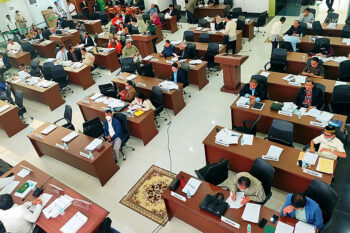CAGAYAN DE ORO CITY (MindaNews / 4 Feb) – Those who want to shift to the federal system with a parliamentary government shouldn’t find it such a big challenge. Such a system has been prescribed by law since long ago (1991) to operate at the closest and most intimate level to everyone—the primary level of government, the barangay.
If we had been earnest about implementing or making it work, by now we would have attained mastery of its dynamics; the grassroots would not be such pathetic victims of traditional politics.
As for federalism, it’s simply a more advanced form of political autonomy, where some powers and functions of the central government are devolved or decentralized to the lower level.
And political autonomy is simply another term for self-governance; and it’s already at hand—prescribed and provided for by the Local Government Code (R.A. 7160).
*****
Under this Code, Filipinos are empowered to govern their own community—formulating its policies, enacting its regulations, passing its ordinances, expending its budget, and developing its economy.
But even after 23 years on the books, it seems that neither our officials nor our citizens have learned how autonomy works, its processes and its mechanisms.
It’s high time we determine whether or to what extent autonomy is operative in our own community and do something to exemplify it. If inoperative or dysfunctional, the Department of the Interior and Local Government (DILG) has a lot of explaining to do.
This department was created precisely to implement the Local Government Code and related autonomy laws.
*****
From the outset, the DILG was capacitated with a huge bureaucracy so it could undertake a grand education-information-communication (IEC) campaign to ensure that people were primed for autonomy.
The objective was—and always has been—to empower the people and their community by ushering them to the home of People Power, the barangay.
They were to be drilled in the dynamics of local governance, to exemplify their role as active partners in governance and development, no longer passive recipients of government goods and services.
In so empowering and enfranchising them as never before, their barangay was to have transformed into a productive political, social, and economic unit.
*****
In other words, the barangay would attain the stature of a small republic from which the Big Philippine Republic would draw its strength. Yes, every barangay a small republic—complete with a polity of sovereign citizens, a defined territory, a government, and, though limited, sovereignty.
Once the constituents were empowered, the barangays, collectively, would constitute a strong, durable foundation for our Big Republic.
This transformation was necessary so that the old system at the grassroots—dominated by traditional politicians and their corrupt practices—would yield to the new regime of People Power and Assertive citizenship.
Too bad that no one, not even the DILG, nor Malacañang or Congress, saw to the Code’s proper implementation, if only to monitor the status of autonomy in the local governments.
*****
Consequently, the entrenched trapos with vested interest in the old, corrupt system took full advantage of the opportunity to avert the empowerment of the people so they could retain control.
Today, not even citizens or civil society groups monitor the conduct of local governance; it is why virtually all localities are dominated by trapos and their greedy dynasties. Against them, advocacy groups and activists are in no position to counter their deftness in corruption and impunity.
Employing dirty tricks, subterfuge, and circumvention, these trapos make short-shrift of anti-graft-and-corruption laws. And with their cronies and co-conspirators, they dominate and freely manipulate the primal level of the economy, cornering its benefits.
Hence, citizens should learn to monitor their own government’s operations (barangay’s), which is way below the line of vision of national agencies and other watch dogs. Unless they do, things will get worse, especially with Congress perennially failing to perform its statutory duty to monitor and guide the implementation and effects of the Local Government Code.
[Manny is former UNESCO regional director for Asia-Pacific; secretary-general, Southeast Asia Publishers Association; director, Development Academy of Philippines; member, Philippine Mission to the UN; vice chair, Local Government Academy; member, Cory Government’s Peace Panel; awardee, PPI-UNICEF outstanding columnist. He is chairman/convenor of the Gising Barangay Movement Inc. valdehuesa@gmail.com]







